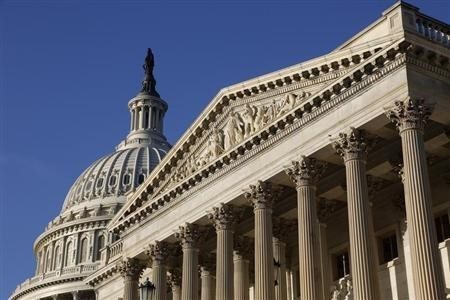Impact of US Default: Another Recession, Market Meltdown and a Bank Run

House Speaker John Boehner's compromise formula failed to gain traction among conservative Republicans, ending hopes that the fiscal stand-off would ease before the US Treasury runs out of money to pay its bills.
The warring factions at the US Capitol will try to avert a breach of the debt-ceiling deadline on 17 October, but a failure to reach an agreement will set off a chain of events that would have serious consequences for the global economy.
A US default on debt commitments is a low probability scenario, but if it happens, its impact will be high and far-reaching.
"A default would be unprecedented and has the potential to be catastrophic: credit markets could freeze, the value of the dollar could plummet, and US interest rates could skyrocket, potentially resulting in a financial crisis and recession that could echo the events of 2008 or worse," says a US Treasury Department report.
Here are a few scenarios:
Another Recession
A US debt default and the consequent tremors in the economy could plunge the world into another recession. The aftershocks will stymie global efforts to crawl out of the 2008 financial crisis. According to a Reuters projection, which extrapolates the impact of the Lehman Brothers collapse on the US economy, the level of US GDP would be 3-4% lower than what it would have been if a debt default had not taken place. Across the globe, a US default will result in around 1.5-2% less growth in GDP.
It is also important that China, a growth engine for the world, will be hit seriously by a US default. A drastic fall in US bond prices and a fall the value of the dollar will erode the value China's dollar holdings. However, analysts have said the Chinese have more or less factored in the impact.
Chief executives of some of the leading global banks met President Barrack Obama last week and told him the effect of a US default on U.S. debt and the dollar were enough to throw the global economy into a tailspin.
"We need global growth ... We are on the verge of getting it. Please let's not shoot ourselves in the foot," JPMorgan CEO Jamie Dimon said.
Dollar Takes a Hit
A US debt default will hit the dollar hard in more ways than one. Analysts say the greenback could lose as much as 20% against most currencies as investors flee the US currency and invest in safe havens, including the Japanese yen and British pound.
Serving a notice to the US on its ratings, Fitch warned that the turmoil in Washington "risks undermining confidence in the role of the US dollar as the pre-eminent global reserve currency."
Secondly, in a post-default rebuilding of the economy, the US Federal Reserve will rather keep its massive stimulus programme in place than taper it down. This will be negative for the dollar.
A US default and the resultant erosion in the value of China's pile of US Treasuries could make Beijing rethink on the structure of its foreign asset holding, so as to make it better guarded against dollar shocks in future. A sell-off by China can add more pressure on the dollar. Japan, the second largest holder of US assets, could follow suit as well, in order to diversify its foreign reserves.
Global Market Crash
Global stock markets could be the first victim of a US default. In 2011, the US narrowly avoided a default by raising the debt ceiling at the last moment. However, as the showdown progressed, the S&P had index dropped as much as 17%.
"Some fear a quick drop of 1,000 points in the Dow Jones Industrial Average. Stock markets in Asia and Europe would likely be hit too. No stock market would be insulated," says a report by CNN Money.
Heightened Global Risk
A default and a consequent downgrading of US debt will have trickle down effects on the global economy. It will trigger a risk-off environment in the financial markets.
A default "would put fear throughout the market and what would happen is you'd see an avalanche of selling ... And selling begets more selling," says Quincy Krosby, a market strategist at Prudent Financial, according to the LA Times.
A look at the US dollar-denominated assets held by countries shows the potential impact of a selling in Treasuries. Major holders like China and Japan, which hold $1.28 trillion and $1.14 trillion respectively, may not face the pressure to sell bonds that have defaulted. Especially, China is not known to deal in bonds as a trader would. However, in the case of institutional investors the world over, the situation is different. They could be forced to offload their holding whose value has plunged, and this could trigger more selling.
Freezing up of US Financial System
A default will lead to the freezing up of the US financial sector and threaten the global economy. If Congress does not reach a deal, the Treasury's payment obligations will be met for a time, but after that a default on government obligations will set in, roiling the complex payment system in the country.
"If it were to occur -- and it's a big if -- one would expect a series of legal triggers, potentially transmitting the default to many other markets ... All this would add to the headwinds facing economic growth. It would also undermine the role of the U.S. in the world economy," Mohamed El-Erian, chief executive officer of Pacific Investment Management Co., the world's largest fixed-income manager, told Bloomberg News.
Funding woes for Banks
Concerns about a possible default caused investors to pull more money from short-term money market funds last week than at any time since the last debt ceiling crisis in August 2011, according to a Reuters analysis. "Overnight costs for loans secured with these bills have also risen, straining a key source of ongoing funding for banks."
Large investors pulled $19.87 billion from money market funds that focus on Treasuries and government-related debt in the week ended October 9, according to the Investment Company Institute.
A squeeze in short-term lending markets could put further pressure on banks. "If money market funds are forced to tell investors they can't take out cash while they rebalance their portfolios, investors will immediately race to get their hands on money from wherever they can find it," says CNN Money.
Emerging Market Impact
The emerging markets will be hit hard by a US default. Even the threat of a U.S. default could hurt emerging markets and the world's most vulnerable people, World Bank President Jim Yong Kim has said.
"We're very concerned. Because right now there's so many headwinds as it is for emerging markets and the developing world, that that kind of impact really could be devastating," Kim told CNN.
© Copyright IBTimes 2024. All rights reserved.























